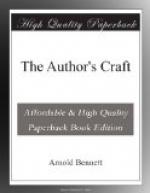III
One reason why a play is easier to write than a novel is that a play is shorter than a novel. On the average, one may say that it takes six plays to make the matter of a novel. Other things being equal, a short work of art presents fewer difficulties than a longer one. The contrary is held true by the majority, but then the majority, having never attempted to produce a long work of art, are unqualified to offer an opinion. It is said that the most difficult form of poetry is the sonnet. But the most difficult form of poetry is the epic. The proof that the sonnet is the most difficult form is alleged to be in the fewness of perfect sonnets. There are, however, far more perfect sonnets than perfect epics. A perfect sonnet may be a heavenly accident. But such accidents can never happen to writers of epics. Some years ago we had an enormous palaver about the “art of the short story,” which numerous persons who had omitted to write novels pronounced to be more difficult than the novel. But the fact remains that there are scores of perfect short stories, whereas it is doubtful whether anybody but Turgenev ever did write a perfect novel. A short form is easier to manipulate than a long form, because its construction is less complicated, because the balance of its proportions can be more easily corrected by means of a rapid survey, because it is lawful and even necessary in it to leave undone many things which are very hard to do, and because the emotional strain is less prolonged. The most difficult thing in all art is to maintain the imaginative tension unslackened throughout a considerable period.
Then, not only does a play contain less matter than a novel—it is further simplified by the fact that it contains fewer kinds of matter, and less subtle kinds of matter. There are numerous delicate and difficult affairs of craft that the dramatist need not think about at all. If he attempts to go beyond a certain very mild degree of subtlety, he is merely wasting his time. What passes for subtle on the stage would have a very obvious air in a novel, as some dramatists have unhappily discovered. Thus whole continents of danger may be shunned by the dramatist, and instead of being scorned for his cowardice he will be very rightly applauded for his artistic discretion. Fortunate predicament! Again, he need not—indeed, he must not—save in a primitive and hinting manner, concern himself with “atmosphere.” He may roughly suggest one, but if he begins on the feat of “creating” an atmosphere (as it is called), the last suburban train will have departed before he has reached the crisis of the play. The last suburban train is the best friend of the dramatist, though the fellow seldom has the sense to see it. Further, he is saved all descriptive work. See a novelist harassing himself into his grave over the description of a landscape, a room, a gesture—while the dramatist grins.




